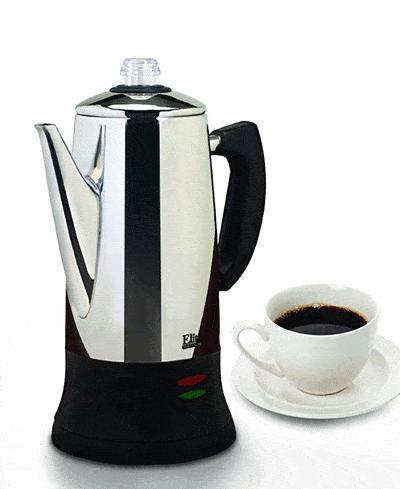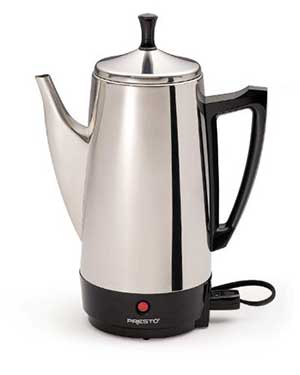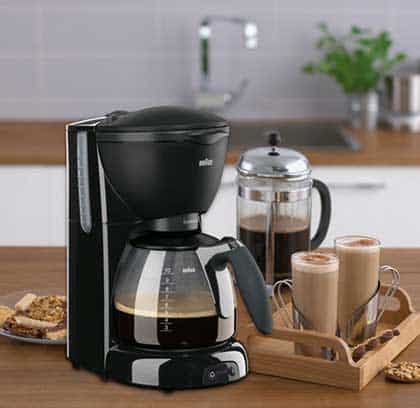It might be somewhat surprising to hear, but the percolator or drip coffee maker discussion almost always evokes surprisingly strong opinions, one way or the other.
If you’ve always been curious about which type of machine makes the better cup of Joe, we’ll attempt to get to the bottom of the mystery here. The short answer is, it depends.
History of the Percolator

Before we talk further about drip vs percolator coffee maker, first, some history. The percolator is old technology that has existed in one form or another since the late Middle Ages.
Of course, over the years, we made some incremental improvements to it. It was right up until the development of the Mr. Coffee drip machine, which first hit store shelves in the 1970’s. Since that time, the popularity of old style percolators has dwindled steadily.
You can still find a few models of percolators for sale online, and some big box store chains may carry one or two models, but they are increasingly a niche product. Most people say that today’s percolators don’t hold a candle to the ones made back in the 50’s.
Also, for fans of the percolator and the coffee it makes, eBay and local thrift stores/antique shops have become the “go-to” sources for good, old school percolators.
Depending on your age, you probably remember growing up with a percolator in your home. The quirky sound of the ever-increasing speed of the perks probably woke you up as a child, and your parents probably sat around the breakfast table enjoying their freshly perked coffee.
What it comes down to is the fact that the two machines (percolator vs drip coffee maker) approach coffee making in two very different ways. In the case of the old school percolator, you are better off using a coarsely ground bean. There are two basic “types” of percolators: stove top models and tabletop models with a heating element at the base of the unit. This latter is what most of us grew up around.
How the Percolator Works
This is how the percolator works. Grounds are loaded into the top chamber, and water into the bottom. The heating element brings the water to a boil, and the boiling water is percolated through a shaft and into the grounds chamber.
The process, by design, means that water may wind up going through the grounds more than once. Also by design, the water going through the grounds is boiling. Put the two together, and the result is what some coffee purists call “over-extracted” coffee.

With the water being so hot, more of the oils from the grounds wind up in the coffee. With the water circulating through the grounds more than once, the coffee winds up being surprisingly strong.
That’s what gives percolated coffee that distinctive strong coffee smells that you grew up with. That’s what inspired a whole generation of Folgers coffee commercials (“The best part of waking up is Folgers in your cup!”)
You probably remember the commercial. Young, good looking college boy comes home for Christmas to surprise his parents and puts a pot of coffee on. The household comes awake, thanks to the rich coffee aroma, and comes downstairs to find their son.
It’s a good commercial that tugs at the heartstrings, but it’s also true. It captures the essence of percolated coffee perfectly. The aroma is just fantastic, and the things that coffee purists complain about (the “over-extraction”) are the very things that fans of percolated coffee like most about it. What they wind up with is a very strong, piping hot cup of coffee.
Coffee Maker Percolator vs Drip
Compare and contrast that to drip made coffee. First, drip coffee makers tend to do better with more finely ground coffee. The water that drips through the filter holding the grounds is not boiling, but several steps shy of the boiling point.

These coffee makers almost always feature a warming plate to keep the coffee warm after brewing, but the coffee they produce is never as piping hot as what you get from a percolator. It’s also not as strong.
Of course, with the design of the machine, there’s no chance that the water can slip through the filter with the coffee grounds more than once. It goes from the dispensing chamber, through the filter, and straight into the pot.
The result is a weaker brew and a more tepid temperature. It’s warm, but not hot. The strength of the brew is entirely dependent on the grounds you put in the filter.
Percolator or Drip Coffee Maker Conclusion
What it ultimately comes down to then if it’s a percolator or drip coffee maker, is personal preference and taste. If you like strong, robust, piping hot coffee in the morning to jumpstart your day, you’re probably going to love percolated coffee. In fact, you’ll likely find the brew that drip coffee machines produce to be weak, barely qualifying as coffee at all.
On the other hand, if you grew up on coffee from a drip-style machine, then a cup of percolated coffee will likely be a shock to your system. It will be much hotter and stronger than anything you’re accustomed to.
I recently purchased an electric percolator and having been a coffee lover and critic for decades, I have never been happier with the taste and temperature of my coffee. I can assure you the water does not go through the basket twice, perhaps with a stove top percolator I don’t know. After watching Dr. Oz revealing drip coffee makers bacterial contamination and how unaware people are of this problem, I’ll stick to stainless steel. Easy to clean everyday. I suspect that people who turn their noses up at percs do not have the facts, probably going by what they have heard and not actually trying a freshly perced cup of coffee. I have read other reviews condemning this method as obsolete, outdated and to be avoided at all cost. What a shame and what a sham. If you are young, probably just going with the current trendoid flow, find out for yourself.
We agree that percolators tend to get a bad rap these days, and it’s a real pity. Personally, we love a strong, piping hot cup of coffee, and that’s exactly what percolators deliver!
You also make an excellent point about bacterial contamination and the fact that far too few people clean their drip-brew coffee makers regularly enough to keep it from occurring. Like you, we LOVE stainless steel. Not only does it look great, but it’s super easy to clean, and that makes it highly convenient.
We understand that everybody’s tastes and preferences are different, but it sounds like we’re on the same page. Here’s to the percolator, and a truly exceptional (and strong!) cup of coffee!
Best regards, and thank you for taking the time to let us know your thoughts. 🙂
I agree…perked coffee is king! I grew up watching my dad perk coffee at all times of the day year round. I use refrigerated cream, which makes drip coffee even more tepid. Powdered creamers just aren’t as good IMHO. I’ve recently tried a drip/single cup duo brewer to save counter space, but the drip coffee is only about 165 degrees when brewed, although the flavor is passable. That’s okay for the summer, but I need my 200 degree coffee in winter. Besides, watching the coffee burble up in the top is entertaining. Long live the king!